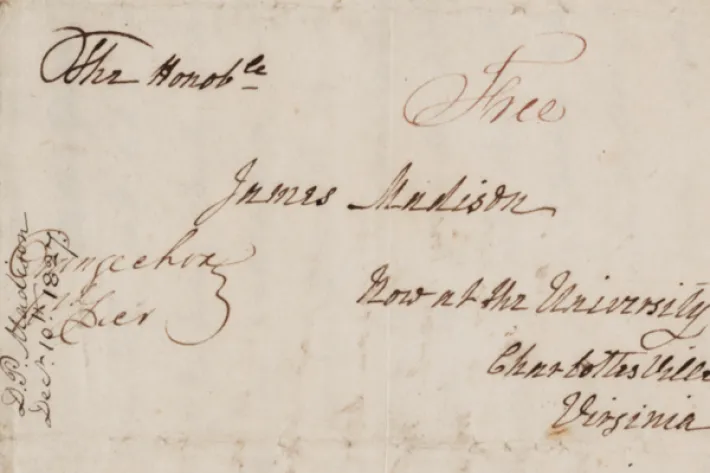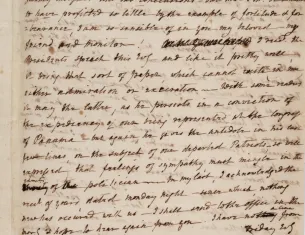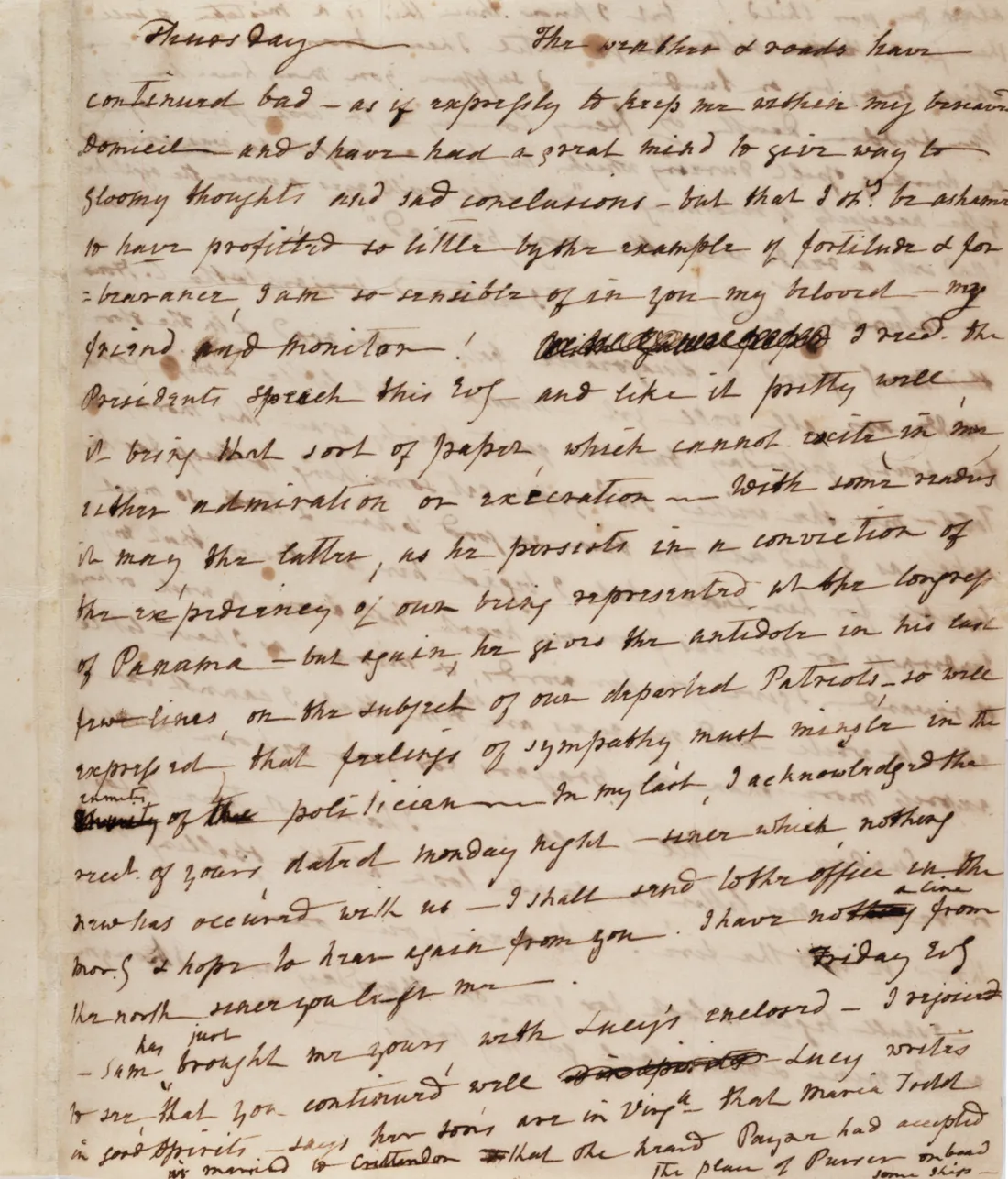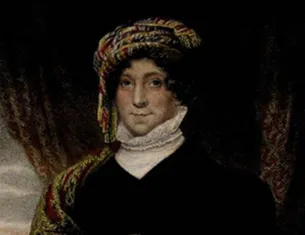Dolley Madison on John Quincy Adams’s State of the Union Address, 1827

A Letter from Dolley Madison to James Madison, December 10, 1827. (The Gilder Lehrman Institute of American History)
In this letter to her husband, Dolley Madison writes that the State of the Union Address delivered by President John Quincy Adams on December 4, 1827, failed to impress her. She then updates Madison on private matters, including the death of a mutual acquaintance after a bout of drinking.
Letter from Dolley Madison to James Madison, December 10, 1827
Thursday The weather & roads have continued bad— as if expressly to keep me within my bereaved Domicile and I have had a great mind to give way to gloomy thoughts and sad conclusions— but that I shd be ashamed to have profitted so little by the example of fortitude & forbearance, I am so sensible of in you my beloved – my friend and monitor! I recd. the Presidents speech this evg and like it pretty well it being that sort of paper; which cannot excite in me either admiration or execration— With some reading it may the better, as he persists in a conviction of the expediency of our being represented at the congress of Panama— but again he gives the antidote in his last few lines, on the subject of our departed Patriots— so well expressed that feelings of sympathy must mingle in the enmity of the politician — In my last, I acknowledged the rect. of yours dated Monday night — since which, nothing new has occurred with us— I shall send to the office in the morg & hope to hear again from you. I have not a line from the north since you left me.
Friday Evg
—Sam has just brought me yours with Lucy’s enclosed— I rejoiced to see that you continued well — Lucy writes in good spirits— says her son’s are in Virga— that Maria Todd is married to Crittendon that she heard Payor had accepted the place of Purser on board some ships alas my poor child! but I know that this is a mistake & will therefore, Hope better things until I hear from himself — which may be on Sunday – I suppose you may have heard of the sudden Death of Henry Conway— It took place after a drinking spell, during which his friends thought he was convinced of the necessity of reforming— “But still, with eyes averse the sight be viewed”“and with a ready will the wrong persued”—
—Saturday night— I ventured to ride to the C. House this mor.g found it dissagreable, both on the road & in the store— We are all well yet— Maria was a little amiss for a few hours, yesterday, but was quite hearty again this morng – she told me she wished I wd go, & get something to keep for her sake, as I had always been so good to her, & took so much trouble for her sake, but I beged her to believe that my tenderness for her was from my heart not from a wish, or thought of reward. I give you her words, & mine as I have little else to write – and my eyes are so dim that I cannot see to express more than my prayers for your repose, & safety. — Sunday.— All’s well.— I have not time to copy or revise my letter, so do not look at the spelling but throw it into the fire. forever your own — I shall begin to look for you on Thursday next. I hope you reced mine & that Paul got my books—
Document Source: Dolley Madison, Letter to James Madison, December 10, 1827. The Gilder Lehrman Institute of American History, GLC01812.
Dolley Madison to James Madison, December 10, 1827
Thursday
. . . I recd.the Presidents speech this evg and like it pretty well it being that sort of paper; which cannot excite in me either admiration or execration — With some reading it may the better, as he persists in a conviction of the expediency of our being represented at the congress of Panama— but again he gives the antidote in his last few lines, on the subject of our departed Patriots — so well expressed that feelings of sympathy must mingle in the enmity of the politician
Friday Evg
. . . I suppose you may have heard of the sudden Death of Henry Conway — It took place after a drinking spell, during which his friends thought he was convinced of the necessity of reforming . . .
— Saturday night —
. . . We are all well yet— Maria was a little amiss for a few hours, yesterday, but was quite hearty again this morng– she told me she wished I wd go, & get something to keep for her sake, as I had always been so good to her, & took so much trouble for her sake, but I beged her to believe that my tenderness for her was from my heart not from a wish, or thought of reward. I give you her words, & mine as I have little else to write – and my eyes are so dim that I cannot see to express more than my prayers for your repose, & safety.
— Sunday.—
All’s well.— I have not time to copy or revise my letter, so do not look at the spelling but throw it into the fire. forever your own
— I shall begin to look for you on Thursday next. I hope you reced mine & that Paul got my books—
Source: Dolley Madison to James Madison, December 10, 1827, The Gilder Lehrman Institute of American History, GLC01812.
execration – condemnation
expediency – usefulness
enmity – bitterness
Background
In this letter to her husband, Dolley Madison writes that the State of the Union Address delivered by President John Quincy Adams on December 4, 1827, failed to impress her. She then updates Madison on private matters, including the death of a mutual acquaintance after a bout of drinking.
Transcript
Letter from Dolley Madison to James Madison, December 10, 1827
Thursday The weather & roads have continued bad— as if expressly to keep me within my bereaved Domicile and I have had a great mind to give way to gloomy thoughts and sad conclusions— but that I shd be ashamed to have profitted so little by the example of fortitude & forbearance, I am so sensible of in you my beloved – my friend and monitor! I recd. the Presidents speech this evg and like it pretty well it being that sort of paper; which cannot excite in me either admiration or execration— With some reading it may the better, as he persists in a conviction of the expediency of our being represented at the congress of Panama— but again he gives the antidote in his last few lines, on the subject of our departed Patriots— so well expressed that feelings of sympathy must mingle in the enmity of the politician — In my last, I acknowledged the rect. of yours dated Monday night — since which, nothing new has occurred with us— I shall send to the office in the morg & hope to hear again from you. I have not a line from the north since you left me.
Friday Evg
—Sam has just brought me yours with Lucy’s enclosed— I rejoiced to see that you continued well — Lucy writes in good spirits— says her son’s are in Virga— that Maria Todd is married to Crittendon that she heard Payor had accepted the place of Purser on board some ships alas my poor child! but I know that this is a mistake & will therefore, Hope better things until I hear from himself — which may be on Sunday – I suppose you may have heard of the sudden Death of Henry Conway— It took place after a drinking spell, during which his friends thought he was convinced of the necessity of reforming— “But still, with eyes averse the sight be viewed”“and with a ready will the wrong persued”—
—Saturday night— I ventured to ride to the C. House this mor.g found it dissagreable, both on the road & in the store— We are all well yet— Maria was a little amiss for a few hours, yesterday, but was quite hearty again this morng – she told me she wished I wd go, & get something to keep for her sake, as I had always been so good to her, & took so much trouble for her sake, but I beged her to believe that my tenderness for her was from my heart not from a wish, or thought of reward. I give you her words, & mine as I have little else to write – and my eyes are so dim that I cannot see to express more than my prayers for your repose, & safety. — Sunday.— All’s well.— I have not time to copy or revise my letter, so do not look at the spelling but throw it into the fire. forever your own — I shall begin to look for you on Thursday next. I hope you reced mine & that Paul got my books—
Document Source: Dolley Madison, Letter to James Madison, December 10, 1827. The Gilder Lehrman Institute of American History, GLC01812.
Excerpt
Dolley Madison to James Madison, December 10, 1827
Thursday
. . . I recd.the Presidents speech this evg and like it pretty well it being that sort of paper; which cannot excite in me either admiration or execration — With some reading it may the better, as he persists in a conviction of the expediency of our being represented at the congress of Panama— but again he gives the antidote in his last few lines, on the subject of our departed Patriots — so well expressed that feelings of sympathy must mingle in the enmity of the politician
Friday Evg
. . . I suppose you may have heard of the sudden Death of Henry Conway — It took place after a drinking spell, during which his friends thought he was convinced of the necessity of reforming . . .
— Saturday night —
. . . We are all well yet— Maria was a little amiss for a few hours, yesterday, but was quite hearty again this morng– she told me she wished I wd go, & get something to keep for her sake, as I had always been so good to her, & took so much trouble for her sake, but I beged her to believe that my tenderness for her was from my heart not from a wish, or thought of reward. I give you her words, & mine as I have little else to write – and my eyes are so dim that I cannot see to express more than my prayers for your repose, & safety.
— Sunday.—
All’s well.— I have not time to copy or revise my letter, so do not look at the spelling but throw it into the fire. forever your own
— I shall begin to look for you on Thursday next. I hope you reced mine & that Paul got my books—
Source: Dolley Madison to James Madison, December 10, 1827, The Gilder Lehrman Institute of American History, GLC01812.
execration – condemnation
expediency – usefulness
enmity – bitterness


